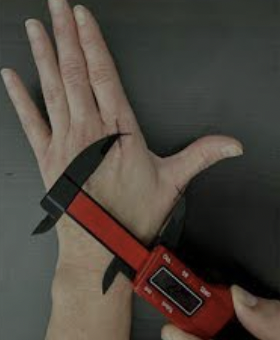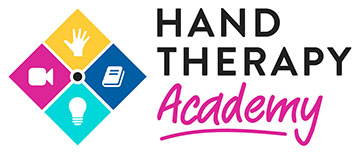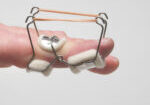THUMB ABDUCTION IN PATIENTS WITH CMC ARTHRITIS? HOW DO YOU MEASURE?
Filed under Evaluation
Article Review
THUMB ABDUCTION IN PATIENTS WITH CMC ARTHRITIS? HOW DO YOU MEASURE?
Corey McGee PhD, OTR/L, CHT , Virginia O’Brien OTD, OTR/L, CHT , Jennifer Skye MS, OTR/L, CHT , Katherine Wall MOT, OTR/L , Thumb Carpometacarpal Palmar and CMC Radial Abduction in Adults with Thumb Carpometacarpal Joint Pain: Inter-rater Reliability and Precision of the Inter-metacarpal Distance Method, Journal of Hand Therapy (2021), doi: https://doi.org/10.1016/j.jht.2021.03.001
THE SKINNY: Hand osteoarthritis is a common condition seen by hand therapists. The thumb joint, in particular, is susceptible to arthritis, and these arthritic changes can lead to contractures of the first webspace, known as a thumb adduction contracture. A common practice for measuring these contracture(s) is to use goniometric measurements to measure radial and palmar abduction, which has been shown not to have the best reliability. The purpose of the study was to determine the inter-rater reliability and precision of using an inter-metacarpal distance method test (IMD) on individuals with CMC arthritis
IN THE WEEDS: Two certified hand therapists of differing clinical and educational backgrounds measured the IMD in patients with a confirmed CMC arthritis diagnosis. The therapist located and marked the 1st and 2nd metacarpal heads at the dorsal midpoints of the joints. A digital caliper was used to measure the distance (mm) between these two points. There were a total of 22 subjects and 28 thumbs.

McGee, C, (2021). Figure 3Radial Abduction IMD Measurement. https://www.jhandtherapy.org/article/S0894-1130(21)00041-7/fulltext
BRINING IT HOMEL: Through statistical analysis is was determined IMC for measuring radial and palmar abduction had excellent reliability, and the precision was found acceptable to excellent. Making this IMD a great choice for measuring thumb abduction.
RATING: This article was well written and can change the standard of practice for measuring thumb abduction. CMC arthritis can cause changes in the joint(s) that lead to loss of palmar and radial abduction and other problems that significantly impact hand function. Therapists play an important role in managing CMC arthritis specifically thumb CMC adduction contractures. The IMD is a more accurate way to track clinical changes. Shortcomings of the study include a small number of participants, even though it was adequately powered. This is an excellent article, and I encourage you to read it for more details.
2 Comments
Leave a Comment
More To Read
Wrist Fractures and Marijuana Use: What are the complications?
Title: Marijuana use and complications with healing after distal radius wrist fracture Article: Livesey, M. G., Bains, S. S., Stern, J. M., Chen, Z., Dubin, J. A., Monárrez, R., … & Ingari, J. V. (2025). Cannabis use in patients with distal radius fractures: a moment of unity?. Hand, 20(2), 263-268. The skinny The impact of tobacco use…
Management of the Stiff Finger: Evidence and Outcomes
Title: Management of the Stiff Finger: Evidence and Outcomes Reference: Yang, G., McGlinn, E. P., & Chung, K. C. (2014). Management of the stiff finger: Evidence and outcomes. Clinics in Plastic Surgery, 41(3), 501–512. https://doi.org/10.1016/j.cps.2014.03.011 Article Review By: Tommi Hintnaus The Skinny: This study focuses on understanding and managing finger stiffness, a condition characterized by…
Hand Therapy as a New Grad or Student
Tips for Getting Prepared for hand therapy as a new grad or a Level II Fieldwork Everything you need to know in hand therapy starts with the upper extremity anatomy. Here is a quick checklist to review and hopefully help get you started in your new hand therapy setting. By: Tristany Hightower I suggest, as…
Taking Alpha-Lipoic Acid for 40 days after Carpal Tunnel Surgery can decrease the likelihood of developing Pillar Pain.
Filippo, B., Granchi, D., Roatti, G., Merlini, L., Sabattini, T., & Baldini, N. (2017). Alpha-lipoic acid after median nerve decompression at the carpal tunnel: A randomized controlled trial. The Journal of Hand Surgery, 4, 236–42. The Skinny – A double-blind, randomized controlled study was performed. Sixty-four patients were randomly assigned into two groups after median…
Sign-up to Get Updates Straight to Your Inbox!
Sign up with us and we will send you regular blog posts on everything hand therapy, notices every time we upload new videos and tutorials, along with handout, protocols, and other useful information.







thanks for sharing! 🙂
Thanks for your commitment and publications to advance our field.
Miranda